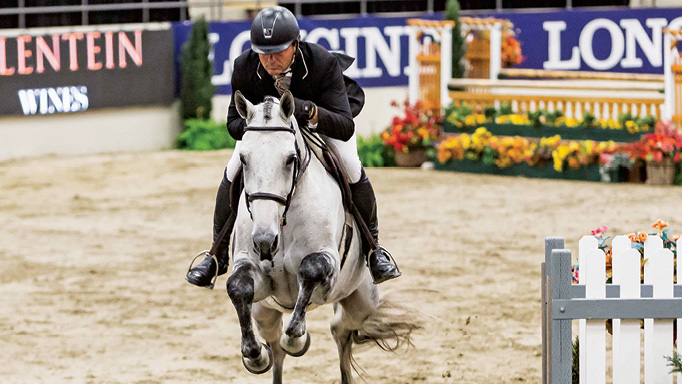It is difficult to pinpoint Brent Balisky’s most significant achievement as a professional in the industry. As a coach, his influence on the next generation of riders is staggering: he has stood ringside at two Olympic Games, has 16 equitation finals winners to his credit, and many riders competing at the grand prix level. He has played a role in producing not only riders with considerable show ring success, but also those who have gone on to become professionals in their own right, including Canadian Team member Tiffany Foster and hunter professional Tara Metzner, a BC native based in California. At Thunderbird Show Stables in Langley, BC, which he owns and operates alongside his wife Laura Tidball-Balisky and niece Laura Jane Tidball, he has developed and shown horses that have amassed wins at some of the most prestigious shows in North America.
Challenge of the derbies
Growing up in Alberta, Brent found himself jumping over natural obstacles on the hunter courses at Spruce Meadows long before the modern hunter derbies. He is appreciating this return to his roots.
“The hunter derbies are my focus at the moment and I am really enjoying them, personally and professionally. It’s been incredible to have the opportunity to focus on developing the skills for both jumpers and now hunters over the natural obstacles,” he explains. “It requires a different way of schooling. Of course, it’s important to give the horse confidence, but while the jumper has to do it with incredible agility and ability and also keep its focus on the rails, the hunter has to do all that while holding its form, style, rhythm, and countless other things. I believe it’s quite a bit more complex to execute the natural obstacles well on a hunter, and I love the challenge of developing and competing a derby horse.”
The 2015 Canadian Hunter Derby Western Series champion, Brent recently found himself stepping into the ring at the Royal Winter Fair for the first time as a competitor, where he contested the Derby Finals aboard Vigalo Z. “It was funny, because I experienced some nerves beforehand,” he says, laughing. “No matter how many times I’ve stood at that gate with students, the prestige and ceremony of the indoor horse shows still make it a big deal.”
Mentors, not babysitters
Brent notes that as a whole, the industry is moving in a positive direction. One of his focuses is on developing horsemanship skills and providing mentorship for young riders.
“One of the things I’m proudest of is that both Laura and I really believe in a strong mentorship for the young professionals that have come from our program,” he explains of his students, both past and present. “I believe in providing guidance to young professionals, and I would like to see that motivation from all trainers in the industry. There are a lot of young people who need to spend more time touching their horses’ legs and really focusing on horsemanship above all else, but that requires proper guidance at key stages of development.
“I believe it’s important for parents of young riders to be focused on finding good skill teachers,” he continues, “and not allow themselves to become stagnated in coaching relationships that become more like babysitting services. Learning skills is one of the most important aspects of the sport. Talent is great, but you must possess skill, which is learned. If we want to grow our sport in Canada, parents need to pay attention. Kids don’t pick trainers, the parents do, and if they want skill in sport, that’s what they need to look for.”
The increasing pressure on young equestrians to earn a post-secondary education is something he encourages. “It’s a changed industry, and an education brings a huge amount to the table,” he believes. “Horses are big business: to be successful, it requires that people have skills that are both natural and learned. I think a lot of respect is brought to the game by being well-rounded. An education will have a crucial impact on how the young professionals conduct themselves in business.”
A heart for the horses
“Riding is my passion,” says Brent. “I pride myself most in my role as a coach, but keeping myself in the ring has also been beneficial to my coaching. I am able to understand what the riders go through, especially when it comes to the importance of mental and physical preparation.”
Reflecting on a career that spans decades, Brent recalls some of his proudest moments. “We bought Easy Boy as a five-year-old and brought him along to his first championship in the international ring,” he remembers. “To see that horse jump clean with Laura his first time through the Devil’s Dyke [at Spruce Meadows] was indescribable; those moments will resonate forever.”
Looking ahead to another busy show season, Brent says, “There are so many horses that have been special and I have some at the moment that I really love, and that’s what makes it fun. It’s important to be a good rider, and a good teacher, and a good trainer – but ultimately, you really must have a heart for the horses.”

